You put on battered old trainers, go out on a jog around the block and pace at what's comfortable because running to lose weight is as simple as putting one foot in front of the other. Right? Actually, no. Sorry to break it to you but there's more to running for weight loss than you might think, which is exactly where we come in.
If you want to run off excess fat to reach a healthy body composition then stick with us.
With everything, how fast you lose weight and where you lose it from varies from person to person based on body type, nutrition, genetics and the rest. There is no one formula for all. However, there are steps that you can take to maximise the results from your miles.
'The only real way to know if running will help you lose weight is to try it,' says Dr Charlie Seltzer, a weight-loss doctor and exercise physiologist. 'Some people will introduce mini-sprints for 10 minutes, three times a week, and experience weight loss, whereas others can train for triathlons and see no drop in weight.'
While we can't lace up your trainers and go striding out for you, we can cover the basics, so you can decide how and when running fits in with your weight loss journey.
1| Can running help me lose weight?If the question is whether running is a good way to strip excess fat from your frame, the definitive answer is (sigh): it depends on your circumstances. Right now, lockdown is causing frustrations up and down the country, with many people impacted financially by COVID-19.
These stressful periods can cause your body to produce high levels of cortisol that can lead to increased fat storage largely around the midsection. So, if you're running more in lockdown but not seeing any results, try to remember that this is an unprecedented time and not get too down on yourself.
2| How much do you need to run to lose weight?While the exact distances are going to depend on how much you currently weigh, your fitness levels and how far you're able to run, there are a couple benchmarks you can use to suss your ideal weekly amount. If we're talking averages – to lose, say 1lb a week, you'd probably need to burn about an extra 500 or more calories every day.
'To do that with running alone [no change in diet] would likely mean taking on a 45-minute run every day of the week for a woman who's 11st 4lb, for instance' says Janet Hamilton, an exercise physiologist and running coach. But, for most, that's just not realistic.
Something a bit more doable – like a 30-minute run, four days a week – would burn about 350 calories per run for the same 11st 4lb, which would lead to weight loss of about 0.2lb per week, according to Hamilton.

Fitbit Versa 2
Fitbit amazon.co.uk£157.98

Garmin Instinct
Garmin johnlewis.com£269.99

Honor Band 5
Honor johnlewis.com£29.99

Apple Watch 5
Apple johnlewis.com£399.00
3| Can you lose weight just by running?Sarah Lindsay, former Olympian and founder of Roar Fitness, warns against a regime of pure cardio, as you're likely to lose muscle as well as fat, which doesn't often work well as a long-term solution to maintaining a healthy body composition.
*This* is the Food Equation to Actually Lose Fat
Try This 4-Week Plan to Safely Lose Belly Fat
'When you're burning calories, that energy comes from fat stores, glycogen stores and then protein – which is essentially muscle,' explains Lindsay. The higher your muscle mass, the higher your basal metabolic rate – in other words, a decrease in muscle means fewer calories burned at rest.
'So, even if the calorie deficit you've created by running is helping you lose weight, as soon as you step out of that calorie deficit again, you'll likely gain unhealthy fat.'
If you love to run, Lindsay says it's a great way to increase overall calorie burn, as long as you also focus on preserving muscle through resistance exercise. 'Three strength-training sessions per week, along with one or two runs, is ideal,' says Lindsay. 'Stick to 45-minute workouts to ensure it's manageable.'
4| Is running the best cardio for fat loss?'Ultimately the most effective form of exercise for weight loss is one you enjoy the most,' says Hamilton. That's because you'll stick to it. (Read: no hard feelings if you and the pavement aren't fast friends.)
'If the idea of running for weight loss makes you feel horrible, don't do it,' adds Dr.Seltzer. After all, there are plenty of ways to move your body with calorie burn in mind, like skipping, kick-boxing, cycling, rowing and yoga.
The best part? They all come with a host of other benefits – think a stronger heart, better bones, decreased risk of cardiovascular disease, better mental health – that have very little to do with numbers on the scale.
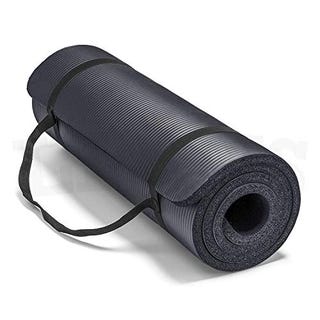
Non-Slip Yoga Mat
Lions amazon.co.uk£10.99
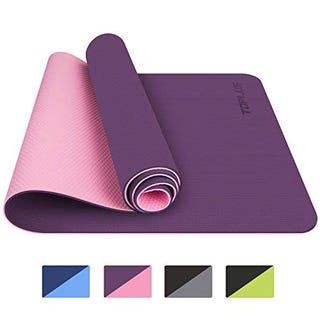
Eco Friendly Yoga Mat
TOPLUS amazon.co.uk£35.99
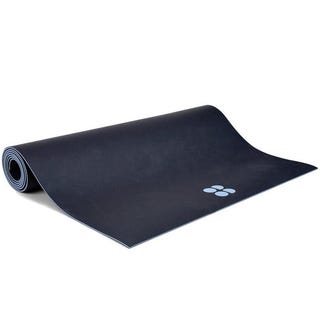
Super Grip Yoga Mat
Sweaty Betty sweatybetty.comUS$85.00
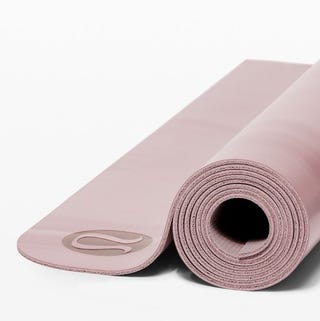
Reversible Yoga Mat
Lululemon lululemon.co.uk£48.00
5| What is the best running plan for fat loss?Research shows that high-intensity interval training (HIIT) workouts– think: sprints, running up and down hills, etc – seem to be most effective for weight loss. In fact, HIIT might burn a third more body fat than moderate-intensity exercise (like jogging), possibly because you're working harder and your body keeps burning fat post-exercise.
Don't love HIIT? Level up to Hamilton's go-to weekly running routine to burn more calories for weight loss:
This is a question that many runners have, however, the answer is quite simple. We've recruited Anita Bean, nutrition expert in new running book I Can Run to explain.
When to eatThe best time to eat pre-exercise is about three or four hours beforehand because it gives your body enough time to begin digesting that food and for some of that energy to then go into your bloodstream and be delivered to your muscles.
If you eat a big meal too close to your running then you're going to feel uncomfortable and heavy, obviously. It's why I'd recommend saving your long runs for the evenings or weekends if possible.
There are also little tweaks you can make along the way. Let's say you like to train at 6pm and you've had your lunch at 1pm. You've got a gap of five hours and could probably do with a top-up before lacing your trainers. A snack around 30 minutes before your run will help to raise your blood sugar a little and ensure that you're not running hungry, plus it'll help you to keep the intensity up for longer.
I Can Run: An Empowering Guide to Running Well Far
Yellow Kite amazon.co.uk£13.19
SHOP NOW
Long runsIf you're setting off in the morning, then it's unlikely you're going to rise at 6am on a weekend just to give your breakfast time to digest. This is when you need to fuel properly the day before. Saturday night is really important for getting in your carbs and your protein and making sure that your muscles are filled with glycogen ready to fuel your exertions. That way, when it comes to Sunday morning, you reach for a banana, a handful of dried fruit or a small bowl of porridge. This will be enough to bump up your blood sugar, see off hunger and make you feel better, ready to run. All you need is that little kickstart to get you out the door and the stores from Saturday night's pasta dish will take care of the rest.
Crucially, this will also teach you to run with the feeling of having some food inside of you. Not a massive meal, but there's no way you can do a marathon without re-fuelling, so training is the time – especially on those long runs – to get used to running with something in your stomach.
Eating while runningEating (or fuelling) during a run comes into play on anything longer than about an hour. Between 60 and 90 minutes is a crucial period because that's when your glycogen stores (the energy in your muscles and your liver) start to deplete and fatigue sets in. You'll have to slow down your pace or you may need to stop altogether. You need to start re-fuelling before you hit rock bottom. If you're new to running and pounding your local park at a steady pace, then the best time to do this is around 45-60 minutes, although this depends on how hard you're pushing and how well you stocked up the night before.
The types of foods you take with you are also crucial. This is where everything you know about nutrition falls apart. You don't need to be having complex, nutrient-dense foods when you're out running. You're after simple carbs and that means sugar. Yes, sugar. It's not good for your teeth, but it's actually really beneficial for your performance because it is absorbed fast, gets into your blood fast and to your muscles fast. This will allow you to keep going for longer at your chosen pace. Try:
Homemade energy balls: work out cheaper than the stuff you're reaching for in Whole Foods. All you need to do is pour a mixture of dried fruit and nuts into a food processor, blitz them and roll them into balls.
Oh, and if you're not sold on natural sources, Jelly Babies also work...
Running gelsThey're heavily promoted and it's easy for runners to think that they need them. You don't. The benefits are that you know you're going to get an exact amount of carbohydrate in one sachet and they're easy to slip into the pocket of your running backpack. But there's nothing fancy or scientific about running gels. They're just sugars and there are, I would suggest, better ways to get those sugars that are, crucially, easier on your digestion.
Because gels are so concentrated they can be quite gloopy and don't sit well in everyone's stomachs. Some people love them, some people hate them. Fuelling during a run is probably the most individual part of a nutrition plan for runners.
How to Use Running Gels: Get the Expert Advice
What you'll find when you've been running for a long time is that things can slow down in the upper part of your gut and speed up in the bottom part of your gut. And that's a recipe for disaster. A gel can go in and, well, come out again pretty much immediately. It does happen to an awful lot of runners and it's why you need to be testing out gels weeks before race day.
Energy Gel Elite
Myprotein myprotein.com£19.99
SHOP NOW
7| Why am I always hungry after running?Namely because you're burning more calories. A 2019 study in the journal Physiology & Behavior found that, after doing moderate-intensity cardio five days a week (to burn 500 calories a day) for 12 weeks, overweight women lost body weight and fat, but, in the process, their hunger levels went up and they ended up consuming more calories.
A great way to assess if your hunger is physical or emotional – perhaps a response to knowing you've exercised – is to employ a mindful eating approach whereby you take a minute to assess your hunger levels before swinging open the fridge. This can help you stay more in tune to what your body needs when.
The solution? Ensure you're eating enough to meet your body's daily requirements before creating an even larger calorie deficit through exercise. Not sure what your body's daily calorie need is – peep our handy calorie calculator to make sure you're getting enough of the good stuff.
8| Need inspiration for your weekly runs?Running needn't be something you slog away at week in week out, doing the same distance at the same pace. In fact, according to David Siik, head of running for über luxe gym chain Equinox, that's the fastest way to injure yourself.
Instead, get yourself a plan that varies the distance and cadence of your runs to keep you trucking on for the long term and in good nick too. Whether that's a beginner 5k running plan or something more advanced, try to stick to the challenging sessions – you'll be a better runner for it.
Your Complete Sofa To 5k Training Plan
Up Your Run Distance with WH's Half Marathon Plan
9| What is the best running kit?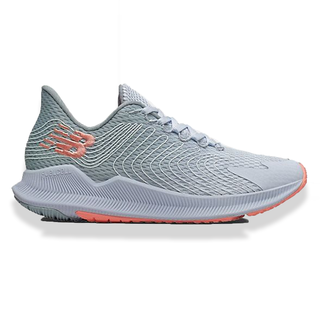
New Balance Fuel Cell Running Trainers
£100.00

Garmin Forerunner® 45S
Garmin garmin.com£149.99
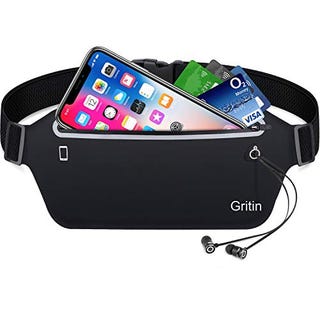
Gritin Running Belt
Gritin amazon.co.uk£7.59

Zero Gravity HW Running Leggings

Nike Shield Women's Running Jacket
nike nike.com.uk£117.95
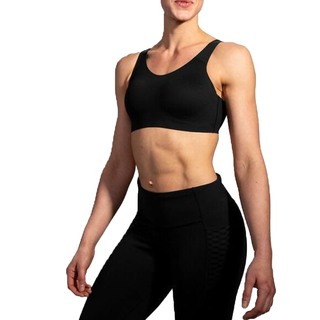
Brooks Dare Scoopback Run Bra
Brooks brooksrunning.com£55.00
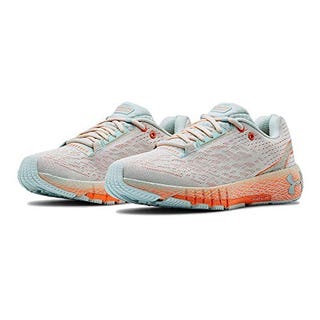
UA HOVR Machina Running Shoes
Under Armour amazon.co.uk£120.72
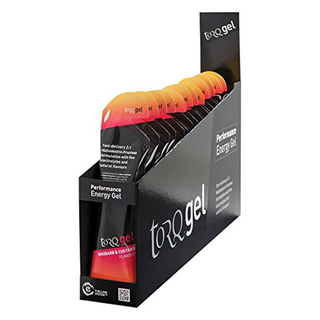
TORQ Gel Rhubarb Custard x 15
TORQ amazon.co.uk£18.99
10| What is the best running app for weight loss?Strava is the new Instagram, according to runners. Although, not a weight loss app per se it is where joggers, runners and racers all unite. Use the app to track your mileage, progress and find new (virtual) running buddies. Here's a 101 on using Strava for running.
Now you've got your training sorted, don't forget to remember to stretch:
Cut through the noise and get practical, expert advice, home workouts, easy nutrition and more direct to your inbox. Sign up to the WOMEN'S HEALTH NEWSLETTER.
Cassie Shortsleeve Freelance Writer Cassie Shortsleeve is a skilled freelance writer and editor with almost a decade of experience reporting on all things health, fitness, and travel. Kirsti Buick Kirsti is Women's Health's Junior Fitness Editor and a qualified personal trainer.
No comments:
Post a Comment